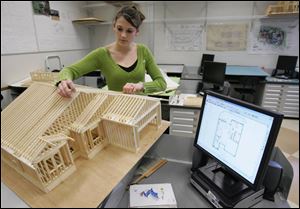
Education tech levy paying off
3/22/2006
Dundee High School senior Laura Schofield.
Steve Seeburger has worked at Dundee Community Schools 33 years, where he directs the district s technology programs and systems.
He remembers when the district bought its first three computers for $10,000 a decision that was widely debated.
They couldn t hardly do anything, he said.
Today Dundee has one of Monroe County s most sophisticated technology systems for students.
The system features everything from an interactive video network studio where Japanese is taught countywide to an internal broadcast cable system.
The district s desktop system is second to none, according to Mr. Seeburger.
We ve gone from three computers to 460, he said.
Dundee s state-of-the-art system along with similar systems at the county s eight other school districts can be directly attributed to a unique technology levy first passed in 1997 that has generated $40 million for Monroe schools.
A renewal of the technology levy the only such levy in the state will be on the May 2 ballot.
It s one of the greatest impacts I ve ever seen in terms of funding for education, said Don Spencer, the county s Intermediate School District superintendent. I don t believe there s another county [in the state] that can touch us.
Mr. Seeburger said there s little doubt about the impact of the levy on the Dundee district. Before the first levy passed, the district s annual technology budget was $40,000, which helped pay part of Mr. Seeburger s salary and for a single computer lab.
Last year, the levy brought in about $350,000. As a result, Dundee schools have 12 computer labs; every classroom has a 34-inch monitor for a desktop PC, allowing for versatile instruction methods; every classroom has VCRs and DVD players; and school announcements are carried out through a power point message system.
The list goes on and on, Mr. Seeburger said. We would have any of this stuff if it weren t for the millage.
He points to Japanese classes offered by the district as a good example of what technology can do. The teacher used to drive from her Tecumseh home giving individual classes at various venues. Now she drives to Dundee High School, where her class is broadcast live to other schools by the district s interactive video network.
Other classes are taught on the same system and plans are to expand the distance learning offerings, Mr. Seeburger said.
The levy will pass if it receives a majority of popular vote. In 1997, it passed by about 300 votes, according to Mr. Spencer. In 2001, it passed by more than 2,700 votes.
People recognize just how important technology is to the future of these kids, he said. In order for our school district to educate these kids in a way to meet their needs, we have to expose [them] to the same technology business is using.
A down area economy and recent voter history of rejecting school levies has the technology levy organizers expanding their education efforts.
The original levy was 1 mill, but it has dropped to 0.986 mills because of readjusted property values. That equates to $50 a year for homeowners with houses valued at $100,000. This year, the millage is generating $214 per student.
The levy doesn t expire until 2007, but officials are putting it on this ballot as a precautionary measure, should it lose, giving them a chance to try again.
We don t plan on losing, Mr. Spencer said.
Contact George Tanber at gtanber@theblade.com or 734-241-3610.